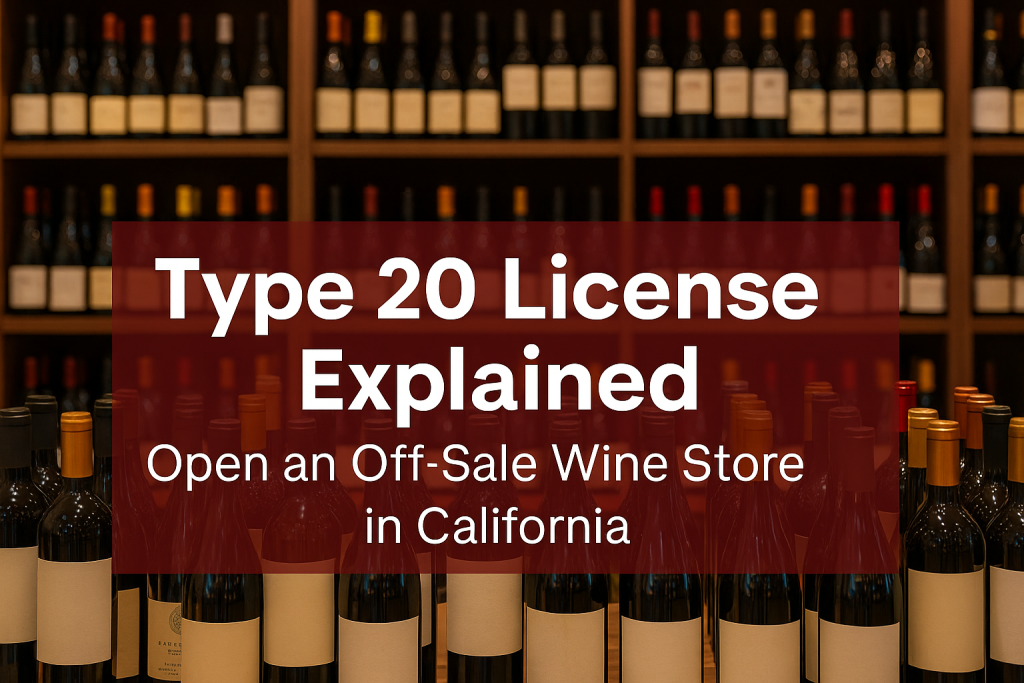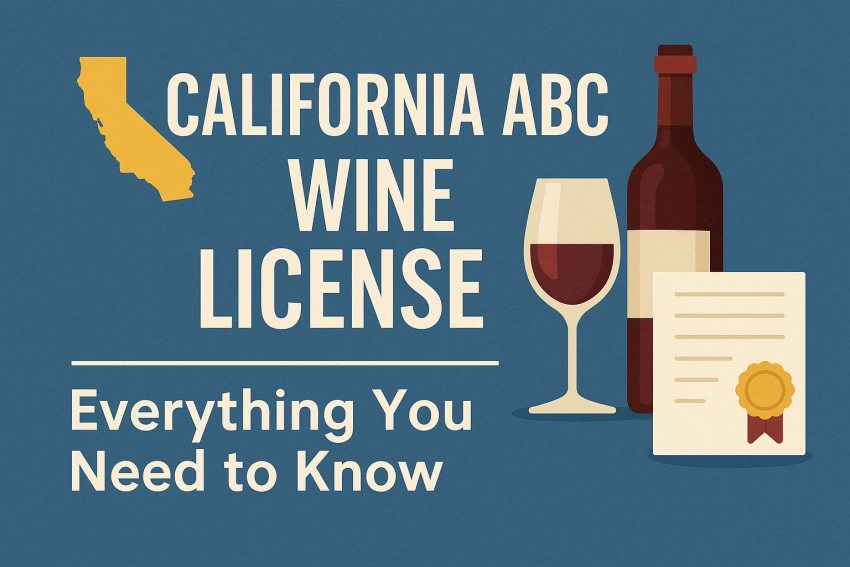Introduction
If you’re planning to sell or serve wine in California, securing a wine license from the California Department of Alcoholic Beverage Control (ABC) is not just important—it’s legally required. The process can seem overwhelming, especially with various license types, strict laws, and local regulations. This guide breaks it all down for you: what the California ABC wine license is, why you need it, how to get one, and how to stay compliant.
What Is the California ABC Wine License?
The California ABC wine license refers to any permit issued by the California Department of Alcoholic Beverage Control that allows an individual or business to sell, serve, or distribute wine within the state.
ABC offers several license types depending on your business model:
- Type 20—Off-Sale Beer & Wine (retail stores, convenience stores)
- Type 21—Off-Sale General (for stores selling beer, wine, and spirits)
- Type 41 – On-Sale Beer & Wine – Eating Place (restaurants)
- Type 42 – On-Sale Beer & Wine – Public Premises (bars, lounges)
- Type 02 – Winegrower License (wineries)
- Type 17/20 Combo—Wine and beer distribution + retail
Each license serves a distinct purpose and has its own set of restrictions.
Why You Need a Wine License in California
Operating without a proper wine license in California is illegal. Here are the top reasons why a wine license is essential:
- Legal Compliance: Avoid fines, business closures, and criminal charges.
- Business Growth: Sell or serve wine legally, increase your offerings, and boost sales.
- Consumer Trust: Licensed establishments attract more trust and credibility.
- Partnerships: Distributors and vendors require proof of licensing.
Types of Wine Licenses in California
Here’s a breakdown of the most commonly used ABC wine license types in California:
1. Type 20—Off-Sale Beer & Wine License
- Used for: Grocery stores, liquor stores, gas stations
- Allows: Selling wine and beer to-go only
- Does NOT allow: Consumption on the premises
2. Type 21 – Off-Sale General License
- Used for: Liquor stores and big-box retailers
- Allows: Sale of wine, beer, and spirits
- Does NOT allow: On-premises consumption
3. Type 41—On-Sale Beer & Wine for Eating Places
- Used for: Restaurants and cafés
- Allows: Serving wine and beer with food
- Does NOT allow: Full bar service (no hard liquor)
4. Type 42—On-Sale Beer & Wine—Public Premises
- Used for: Bars, taverns, nightclubs
- Allows: Serving beer and wine without food requirement
- Requirements: Must not admit under-21s unless food is served
5. Type 02 – Winegrower License
- Used for: Wineries and wine producers
- Allows: Production, bottling, and selling of wine
- Also allows operating tasting rooms and direct-to-consumer shipping
How to Apply for a California ABC Wine License
Step 1: Choose the Right License Type
Select the license that fits your business—off-sale, on-sale, winegrower, etc. Use ABC’s official license lookup or consultation tools if unsure.
Step 2: Complete the Application
You can start the application on the ABC Online Services portal. Information you’ll need includes:
- Business entity info (LLC, Corporation, Sole Proprietor)
- Premises address and layout
- Type of alcohol sold
- Zoning clearance from local city/county
Step 3: Local Zoning and Permits
Before ABC grants a license, your business must meet local zoning requirements. Check with your city planning department to ensure your location allows alcohol sales.
Step 4: Pay Fees
Each license has specific fees. For example:
- Type 41: ~$500
- Type 20: ~$400
- Type 02 (Winegrower): Varies by production size
Additional fees include annual renewal fees, transfer fees (if buying an existing license), and application processing fees.
Step 5: Post Public Notice
You must post a Notice of Application on the premises for 30 days. This allows public and local agencies to object, if necessary.
Step 6: Background Checks & Inspection
ABC will conduct background checks and possibly a site inspection. Your criminal history, prior license violations, and business integrity will be reviewed.
Step 7: License Approval
If all goes well, your license will be approved in 60–90 days. You’ll receive a physical license certificate to display at your location.
Tips for a Smooth ABC License Process
- Work with an ABC consultant if the process feels too complex.
- Start early—permits and zoning approvals can take weeks.
- Have a clean background—criminal or financial issues can delay approval.
- Avoid misrepresentation—accurate info is critical to license approval.
How to Maintain Compliance After Getting Licensed
Once you obtain your California ABC wine license, you must remain in compliance with state laws:
- Do not sell to minors. Always check ID for anyone under 30.
- Avoid over-serving: Servers should stop service to intoxicated customers.
- Renew on time: Annual renewals are mandatory and must be paid on time.
- Maintain signage: Your license must be visible to the public.
- Train staff: Use ABC’s Responsible Beverage Service (RBS) training.
Can You Transfer a Wine License in California?
Yes, California ABC allows certain wine licenses (like Type 20 or 41) to be transferred from one owner to another, or to a new location. However:
- ABC must approve the transfer.
- You may still need local zoning clearance.
- Transfer fees and background checks apply.
Pro Tip: Transferring a license is often faster than applying for a brand-new one.
Common Violations to Avoid
Stay aware of these common infractions:
- Selling wine without a valid license
- Selling to underage or intoxicated persons
- Operating outside allowed hours
- Making false claims on your application
- Allowing unlicensed activity at your premises
Violations can lead to suspension, revocation, or hefty fines.
Useful Resources
- California ABC Official Site: https://www.abc.ca.gov
- License Type List: https://www.abc.ca.gov/licensing/license-types/
- RBS Training Portal: https://www.abc.ca.gov/education/rbs/
- ABC License Lookup Tool: https://aca6.accela.com/CalABC/
Conclusion
Whether you’re opening a restaurant, starting a winery, or launching a retail shop, a California ABC wine license is a must-have legal requirement. Understanding the types of licenses, the application process, and the compliance standards will help you run a successful—and legal—alcohol-related business in California.
Don’t let red tape hold you back—get licensed, stay compliant, and watch your business flourish.





1 thought on “California ABC Wine License: Types, Cost, and How to Apply”